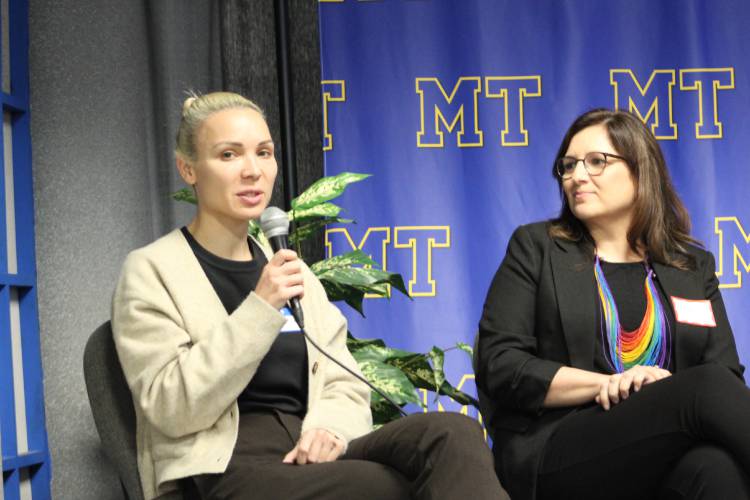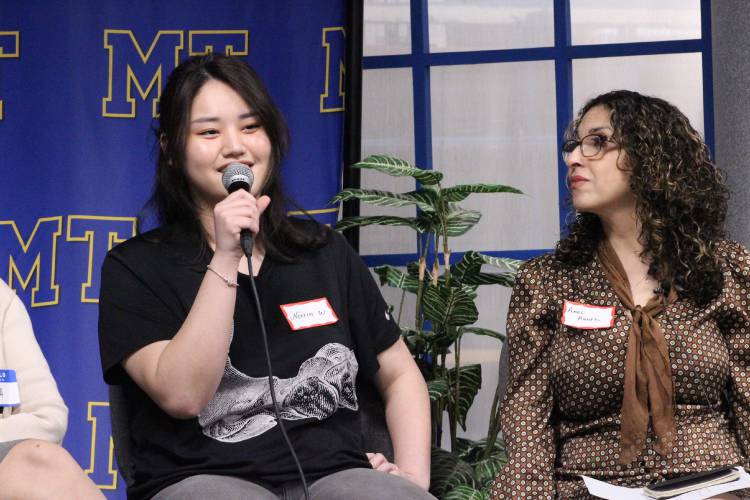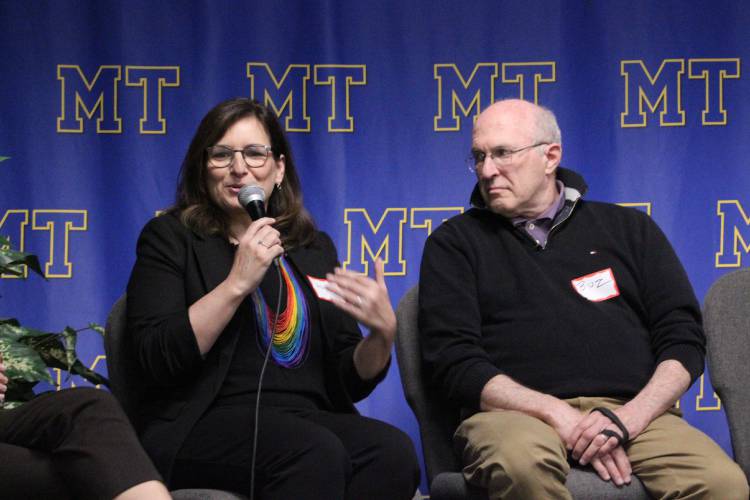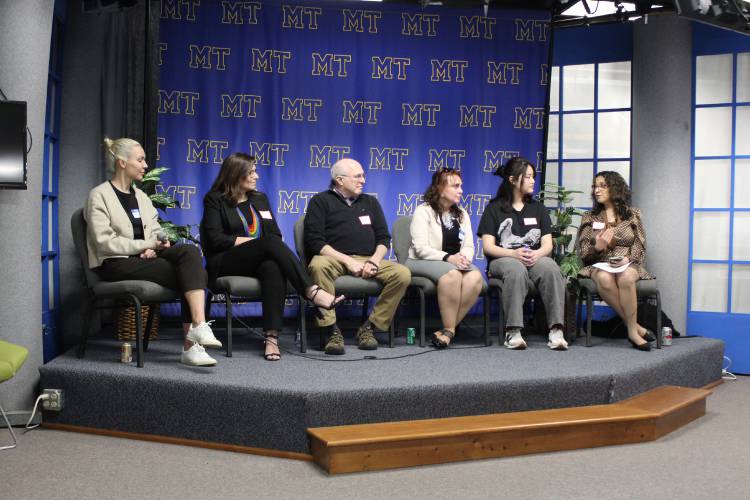‘I waited my whole life for this’: Immigrants share their stories of coming to America
| Published: 05-05-2025 5:08 PM |
BUCKLAND — In conjunction with the “Voices and Votes: Democracy in America” Smithsonian exhibit on democracy that is now on display at Mohawk Trail Regional School, the school partnered with the Center for New Americans for a panel welcoming immigrants to tell their stories of becoming Americans.
“I really clearly remember my immigration process. I remember waiting for hours in line at the U.S. embassy in Nepal. I stood there for two hours and I was dressed up formally for the first time in my life, and I was alone, because you couldn’t bring parents with you for the interview,” said Norzin Wangmo, a senior at Mohawk Trail Regional School who is originally from Tibet. “I was holding so many things and so much paperwork that I barely understood, I was navigating it all by myself. … [A woman] asked me some basic questions and then, after hours, said, ‘Congrats, you have your visa.’ I was like, ‘Wow, I waited my whole life for this.’”
Panelists who spoke Thursday included immigrants from different backgrounds who came to the United States for a variety of reasons, such as accompanying parents or spouses, seeking jobs and advanced degrees, and seeking safety and opportunity.
They recalled feeling excitement, fear and discomfort about their new homes.
“For me as a 14-year-old, it was exciting. I heard all these amazing things about the United States and I had seen the Hollywood movies. I thought the roads were made out of gold and everyone had a big mansion — you know, the things kids would think from watching TV,” said Anastasia McWilliams, who immigrated to the U.S. from Ukraine when her father received a job offer from the University of Massachusetts Amherst. “But it was also a little scary because my dad had a year-to-year visa, so every year we had to worry about his visa being renewed based on the budget and funding, and politics in the department and what was going on in the university.”
Ana Paula Schantz, a social studies teacher from Brazil, and Rosa Guerra, an education and career advisor at the Center for New Americans who is from Argentina, added that in addition to the fears immigrants face about whether their visas will be renewed and the citizenship process, they also deal with cultural differences and learning new behaviors and languages.
“As Latinos, we are very expressive and direct. Here, everyone is more polite and subtle. We love to hug and kiss, so I had to refrain myself,” Guerra said. “I remember the first time I was at a gathering, and when I was leaving there was an American woman. I said, ‘OK bye,’ and I kissed her. Then I said, ‘I’m sorry,’ and explained we kiss everybody.”
“In Portuguese I have this whole universe that doesn’t relate to what I know in English,” Schantz said. “Sometimes I have to rethink what I’m trying to say so it fits in that vocabulary and it’s frustrating because it limits my emotions.”
Article continues after...
Yesterday's Most Read Articles
 PHOTOS: Non-life-threatening injuries result from Whately crash
PHOTOS: Non-life-threatening injuries result from Whately crash
 Franklin County students named to spring dean’s list at UMass Amherst
Franklin County students named to spring dean’s list at UMass Amherst
 My Turn: Regionalization benefits health of students
My Turn: Regionalization benefits health of students
 The hot new spot in Shelburne Falls: Hotfire Bar and Grill feels in many ways like a home kitchen
The hot new spot in Shelburne Falls: Hotfire Bar and Grill feels in many ways like a home kitchen
 A Dream Summer: Greenfield 8U Ducks make history with state title win
A Dream Summer: Greenfield 8U Ducks make history with state title win
 Pushback: Spending locally builds a stronger Greenfield ‘ecosystem’
Pushback: Spending locally builds a stronger Greenfield ‘ecosystem’
The panelists said while learning a new culture can be difficult, they feel lucky to live in Massachusetts, where they feel most people are welcoming to immigrants.
“It’s not something we should tolerate; it’s something we should celebrate,” Ashfield resident Stewart “Buz” Eisenberg said of immigration. Eisenberg was born and raised in the U.S., but his ancestors immigrated to America to escape persecution during the Holocaust.
While the panelists are at different stages of the immigration process, with some having earned citizenship and others living with a green card, they all agreed that they have adopted some elements of American culture while maintaining aspects of their home culture, and they live with a multinational identity.
“I’ve never really had a solid identity. I’m Tibetan, but Tibet doesn’t really exist because it was annexed by China. Then I lived in India, then Nepal,” Wangmo said. “I’m Tibetan, but if you call me Indian it doesn’t make a difference. If you call me Nepali, I’ll say I’m Nepali. If you say I’m American, I’ll say I’m American. It just depends on what country I’m in.”
Panelists were also asked about the current political climate as the Trump administration reshapes border security and legal immigration processes, increases detention capacity and deportations, and rolls back protections. They said they love their lives in America, but they hate how immigrants are being treated.
“It makes me so angry when I hear people say, ‘Well, you came here the right way,’” McWilliams said. “I had a little stamp in my passport, a visa, a little tiny sticker, and that’s the only difference between me and another person who’s trying to get a better life for their children and going through all this trouble to immigrate.”
Guerra said that events and classes held at the Center for New Americans, which has locations in Greenfield, Amherst, Northampton and Springfield, have seen a drastic decline in participation over the past few months. Immigrants have expressed a fear that even visiting the center will put a target on them. The organization’s “Immigrant Voices: A Celebration of Arts” event, which highlights the diversity of artistic traditions represented by immigrants in western Massachusetts, was also canceled.
Eisenberg said everyone has a right to due process and to speak their mind. He added that deportations of immigrants without a court process are unconstitutional and “as unAmerican as it gets.”
“Being an American is not just about enjoying all this country has to offer; it’s having the courage to stand up to tyranny,” he said. “Those are human rights, not just rights afforded to Americans.”
The full panel discussion was recorded and can be viewed at youtube.com/watch?v=sfpxdfacNf4.
Reach Madison Schofield at 413-930-4579 or mschofield@recorder.com.










 ‘Without us, there is no UMass’: Unions representing staff decry bargaining tactics by administration
‘Without us, there is no UMass’: Unions representing staff decry bargaining tactics by administration New owner bringing ‘right energy’ to Main Street Bar & Grille in Greenfield
New owner bringing ‘right energy’ to Main Street Bar & Grille in Greenfield Greenfield opens cooling centers in response to high temps
Greenfield opens cooling centers in response to high temps Giving old garments new life: Greenfield Public Library starts mending clinic
Giving old garments new life: Greenfield Public Library starts mending clinic
